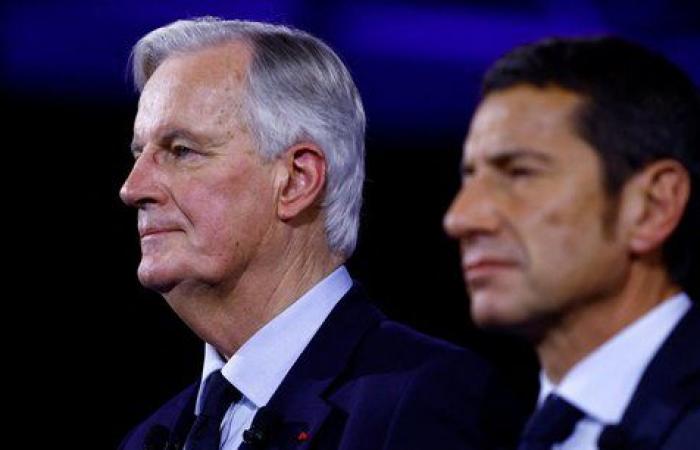This is what is called in performing arts putting the room in your pocket. Having just concluded the congress of mayors this Thursday afternoon, Michel Barnier made the room laugh: “I did well to come.” And to add to the address of the president (LR) of the mayors of France (AMF), David Lisnard, and his first deputy vice-president (PS), André Laignel: “I was not shocked by what either of you said and I find myself very much in your proposals, your criticisms and the expression of anger,” triggering applause from the city councilors present. The tenant of Matignon then turned into a standards hunter. On the other hand, he has not changed his position regarding the effort requested from local elected officials within the framework of the 2025 finance law.
From 5 to 2 billion euros: the Senate determined to lower the effort of communities
Less talkative laws
Attached to “partnership with the territories”, such as the title of the ministry he entrusted to Catherine Vautrin, Michel Barnier thus judged not “normal, nor fair to show the municipalities as responsible for the deficit”. Before committing to “ unlock their potential and facilitate their daily functioning “. How ? With less talkative laws, which stick to general objectives
“We will look text by text, standard by standard, where France has overtransposed European directives, and not only in agriculture. We will remove these overtranspositions [afin] to put an end to the normative inflation which has run amok in Brussels and in our country,” promised the Prime Minister.
He therefore asked all administrations to propose orientation laws, framework laws, which set objectives, and not means, but also to integrate into the impact studies of legislative texts the effects on local authorities and SMEs. That's not all: the Council of State will evaluate and simplify the stock of standards. A historic request from mayors who continually denounce undue costs.
Local authorities: Gabriel Attal calls for “a simplification plan” to reduce “obsolete standards”
Build housing and factories
Michel Barnier thus confirmed that the transfer of water and sanitation to intermunicipalities on January 1, 2026 would no longer be obligatory. Above all, he promised to adapt the policy of zero net artificialization (ZAN) of land, without abandoning the 2050 objective with regard to natural disasters. And for good reason, we must continue to build housing and factories, as the Senate told him at the beginning of October.
The Upper House is definitely very listened to. The government will support its bill aimed at establishing a trajectory for reducing land take in consultation with local elected officials (TRACE). “We need to think in terms of trajectory rather than an exact date,” insisted the tenant of Matignon. So the deadline of November 2025 for SRADDETs in each of the regional councils is over.
However, Michel Barnier has not forgotten the national plan for adaptation to climate change (PNACC), unveiled at the end of October, hammering home his credo : « Prevention is less expensive than repair “. And to announce the opening of a construction site “ difficile »: insurance and reinsurance of public goods in the face of the violence of crises.
A “territory fund”
After these first announcements, the Prime Minister returned to the budgetary context: “I know your concerns and I will not point the finger at communities.” The refocusing of the VAT compensation fund (FCTVA) on investment expenditure – 800 million euros in planned savings – will not be retroactive.
“It would not be fair to the investments you are making”
Michel Barnier also had a word on the precautionary mechanism. As a reminder, it consists of setting aside funds in order to ultimately strengthen local precautionary and equalization mechanisms. In other words, to contribute to a national fund to help local elected officials, who are experiencing occasional difficulties. In this, the government intends to recover 3 billion euros. To do this, it plans to take 2% from local elected officials, whose operating revenues exceed 40 million euros.
The Prime Minister maintained his desire to “ curb these operating expenses », because they contribute to the public deficit », more “this money will return to the municipalities which will be collected”. “The opposite would not have been fair,” he insisted. At the same time, state allocations will be merged into a “territory fund” from January 1, 2025.
The elected officials remain “more than their hunger”
At the end of this speech lasting almost an hour, the executives of the Association of Mayors of France “are more than satisfied”. Edile (LR) of Lampertheim (Bas-Rhin) and general secretary of the AMF, Murielle Fabre certainly felt the desire of Michel Barnier for their “reach out” and their ” give back [leur] capacity to act”, but would have liked to hear it on fiscal and financial autonomy.
A historic demand from local elected officials, starting with André Laignel. “The Prime Minister was kind, but nothing was really announced on the financial level,” regrets the councilor of Issoudun (Indre). It remains for the Senate to reverse the trend next week with the arrival of the government budget.






